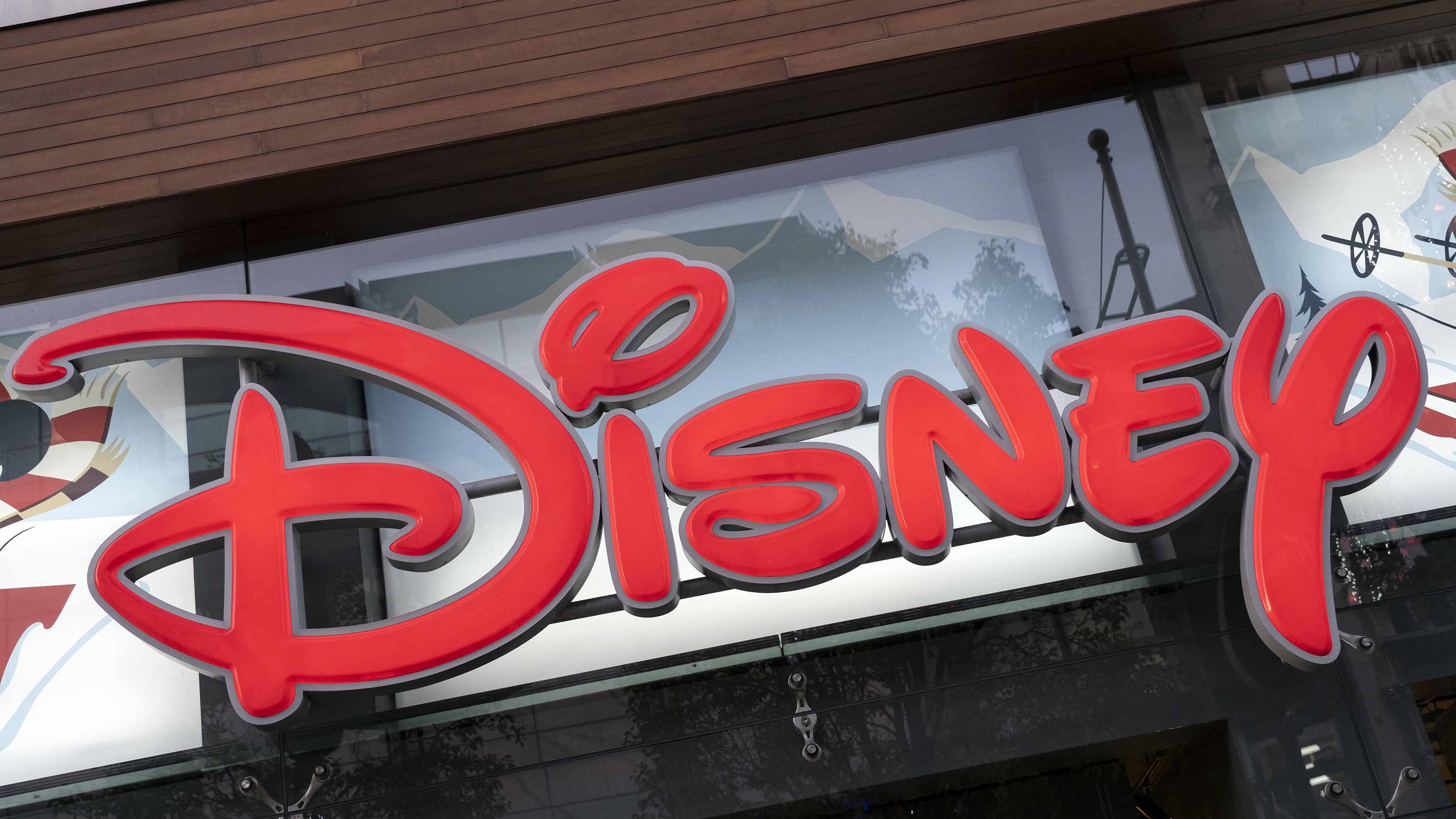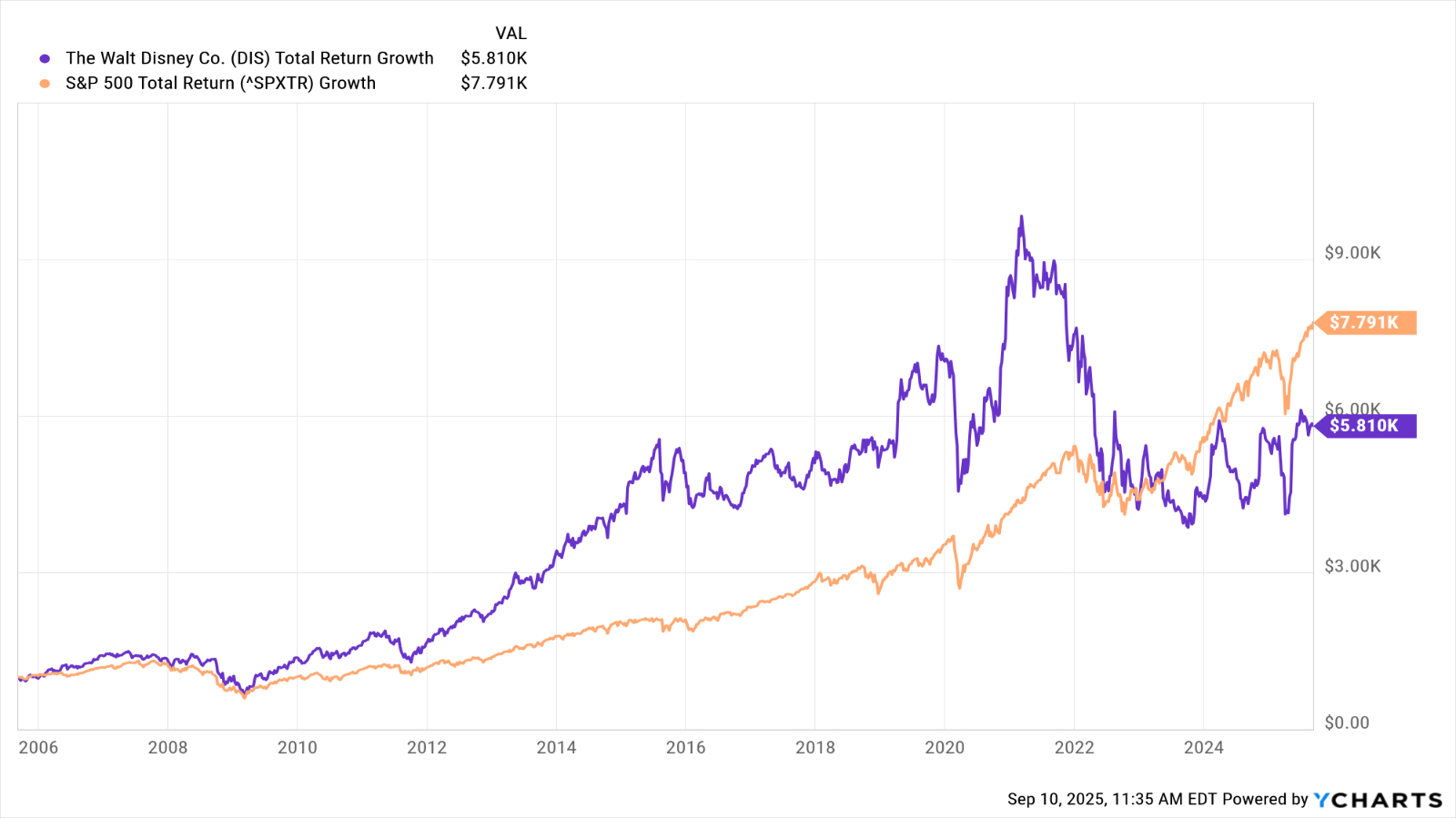If You'd Put $1,000 Into Disney Stock 20 Years Ago, Here's What You'd Have Today
Long-time market laggard Disney stock has been a buy-and-hold bust.



Profit and prosper with the best of Kiplinger's advice on investing, taxes, retirement, personal finance and much more. Delivered daily. Enter your email in the box and click Sign Me Up.
You are now subscribed
Your newsletter sign-up was successful
Want to add more newsletters?

Delivered daily
Kiplinger Today
Profit and prosper with the best of Kiplinger's advice on investing, taxes, retirement, personal finance and much more delivered daily. Smart money moves start here.

Sent five days a week
Kiplinger A Step Ahead
Get practical help to make better financial decisions in your everyday life, from spending to savings on top deals.

Delivered daily
Kiplinger Closing Bell
Get today's biggest financial and investing headlines delivered to your inbox every day the U.S. stock market is open.

Sent twice a week
Kiplinger Adviser Intel
Financial pros across the country share best practices and fresh tactics to preserve and grow your wealth.

Delivered weekly
Kiplinger Tax Tips
Trim your federal and state tax bills with practical tax-planning and tax-cutting strategies.

Sent twice a week
Kiplinger Retirement Tips
Your twice-a-week guide to planning and enjoying a financially secure and richly rewarding retirement

Sent bimonthly.
Kiplinger Adviser Angle
Insights for advisers, wealth managers and other financial professionals.

Sent twice a week
Kiplinger Investing Weekly
Your twice-a-week roundup of promising stocks, funds, companies and industries you should consider, ones you should avoid, and why.

Sent weekly for six weeks
Kiplinger Invest for Retirement
Your step-by-step six-part series on how to invest for retirement, from devising a successful strategy to exactly which investments to choose.
Walt Disney (DIS) stock is showing signs of life again vs the broader market, but long-term shareholders might be forgiven if they've grown impatient with their returns.
Disney was having a terrific 2024 through late May. Shares were up 35% for the year to date, making DIS the best-performing component of the Dow Jones Industrial Average.
Then the bottom fell out. The media and entertainment giant's revenue came up short of Wall Street's expectations. DIS stock predictably paid the price.
From just $107.88 $24.99 for Kiplinger Personal Finance
Become a smarter, better informed investor. Subscribe from just $107.88 $24.99, plus get up to 4 Special Issues

Sign up for Kiplinger’s Free Newsletters
Profit and prosper with the best of expert advice on investing, taxes, retirement, personal finance and more - straight to your e-mail.
Profit and prosper with the best of expert advice - straight to your e-mail.
Wall Street, however, continued to be bullish on the name — and that turned out to be a canny call for traders. After all, DIS stock went on to rally sharply off its summer nadir.
For all of 2024, however, DIS once again lagged the performance of the S&P 500 — an all-too-frequent occurrence. Indeed, shares underperformed the broader market through the first eight-plus months of 2025, too.
That's just how it's been for a good long while. On an annualized total return basis (price change plus dividends), DIS comes up well short of the broader market over pretty much any standardized period you care to measure beyond the past year.
Everyone remembers how the pandemic clobbered Disney, whose theme parks and film businesses were epically exposed to COVID-19. Dividend investors certainly recall that the company suspended its payout in the early months of the outbreak to conserve cash.
Disney reinstated the dividend at the end of 2023. It was welcome news for income investors and certainly helped bolster the share price.
Perhaps fewer remember how DIS stock more than doubled from March 2020 to March 2021, when shares hit an all-time high as a pandemic recovery play. At the top, Disney boasted a market cap of more than $366 billion.
What Disney shareholders would probably like to forget is that DIS is still far below its peak. Shares have lost more than 40% of their value since hitting a closing high back in March 2021, shedding more than $160 billion in market value in the process.
To put such a sum in context, that's more than the market values of six of 30 Dow Jones stocks, including Amgen (AMGN), Honeywell International (HON) and Nike (NKE).
DIS was one of the 30 best stocks in the world in the three decades ended 2020. What happened?
The rise of streaming and other tectonic changes in the past decade have Disney facing tough questions.
If CEO Bob Iger's first tenure was all about acquiring assets and making Disney bigger, his sequel run as top executive is all about remaking Disney for the new competitive landscape.
The bottom line on Disney stock
As noted above, Disney was one of the best stocks in the world over the three decades from 1990 to 2020. Mostly, though, it's been a huge bust.
While it's true that you can manipulate historical returns by fussing with their beginning and end points, Disney's record vs the broader market over pretty much any standardized period you care to measure is terrible.
For its entire history as a publicly traded company, Disney stock has generated an annualized total return of 8.2%. That trails the S&P 500 by about 2.5 percentage points.

The past two decades have been only a little better for Disney, with shares returning 9.2% vs 10.8% for the broader market.
To get a sense of what this underperformance looks like on a brokerage statement, have a gander at the above chart. Note that if you put $1,000 into Disney stock 20 years ago, it would be worth about $5,800 today.
The same amount invested in the S&P 500 two decades ago would theoretically be good for about $7,800 today.
Disney shareholders expected more. If they feel those returns are disappointing, they are not wrong.
If there's a sliver of a silver lining for buy-and-hold Disney investors, at least Wall Street likes its chances of beating the market in the next 12 to 18 months.
Of the 30 analysts issuing opinions on DIS stock surveyed by S&P Global Market Intelligence, 19 rate it at Strong Buy, four say Buy, six have it a Hold, and one calls it a Strong Sell. That works out to a consensus recommendation of Buy, with strong conviction.
More Stocks of the Past 20 Years
- If You'd Put $1,000 Into Intel Stock 20 Years Ago, Here's What You'd Have Today
- If You'd Put $1,000 Into IBM Stock 20 Years Ago, Here's What You'd Have Today
- If You'd Put $1,000 Into Apple Stock 20 Years Ago, Here's What You'd Have Today
Profit and prosper with the best of Kiplinger's advice on investing, taxes, retirement, personal finance and much more. Delivered daily. Enter your email in the box and click Sign Me Up.

Dan Burrows is Kiplinger's senior investing writer, having joined the publication full time in 2016.
A long-time financial journalist, Dan is a veteran of MarketWatch, CBS MoneyWatch, SmartMoney, InvestorPlace, DailyFinance and other tier 1 national publications. He has written for The Wall Street Journal, Bloomberg and Consumer Reports and his stories have appeared in the New York Daily News, the San Jose Mercury News and Investor's Business Daily, among many other outlets. As a senior writer at AOL's DailyFinance, Dan reported market news from the floor of the New York Stock Exchange.
Once upon a time – before his days as a financial reporter and assistant financial editor at legendary fashion trade paper Women's Wear Daily – Dan worked for Spy magazine, scribbled away at Time Inc. and contributed to Maxim magazine back when lad mags were a thing. He's also written for Esquire magazine's Dubious Achievements Awards.
In his current role at Kiplinger, Dan writes about markets and macroeconomics.
Dan holds a bachelor's degree from Oberlin College and a master's degree from Columbia University.
Disclosure: Dan does not trade individual stocks or securities. He is eternally long the U.S equity market, primarily through tax-advantaged accounts.
-
 Dow Adds 1,206 Points to Top 50,000: Stock Market Today
Dow Adds 1,206 Points to Top 50,000: Stock Market TodayThe S&P 500 and Nasdaq also had strong finishes to a volatile week, with beaten-down tech stocks outperforming.
-
 Ask the Tax Editor: Federal Income Tax Deductions
Ask the Tax Editor: Federal Income Tax DeductionsAsk the Editor In this week's Ask the Editor Q&A, Joy Taylor answers questions on federal income tax deductions
-
 States With No-Fault Car Insurance Laws (and How No-Fault Car Insurance Works)
States With No-Fault Car Insurance Laws (and How No-Fault Car Insurance Works)A breakdown of the confusing rules around no-fault car insurance in every state where it exists.
-
 Dow Adds 1,206 Points to Top 50,000: Stock Market Today
Dow Adds 1,206 Points to Top 50,000: Stock Market TodayThe S&P 500 and Nasdaq also had strong finishes to a volatile week, with beaten-down tech stocks outperforming.
-
 The Best Precious Metals ETFs to Buy in 2026
The Best Precious Metals ETFs to Buy in 2026Precious metals ETFs provide a hedge against monetary debasement and exposure to industrial-related tailwinds from emerging markets.
-
 For the 2% Club, the Guardrails Approach and the 4% Rule Do Not Work: Here's What Works Instead
For the 2% Club, the Guardrails Approach and the 4% Rule Do Not Work: Here's What Works InsteadFor retirees with a pension, traditional withdrawal rules could be too restrictive. You need a tailored income plan that is much more flexible and realistic.
-
 Retiring Next Year? Now Is the Time to Start Designing What Your Retirement Will Look Like
Retiring Next Year? Now Is the Time to Start Designing What Your Retirement Will Look LikeThis is when you should be shifting your focus from growing your portfolio to designing an income and tax strategy that aligns your resources with your purpose.
-
 I'm a Financial Planner: This Layered Approach for Your Retirement Money Can Help Lower Your Stress
I'm a Financial Planner: This Layered Approach for Your Retirement Money Can Help Lower Your StressTo be confident about retirement, consider building a safety net by dividing assets into distinct layers and establishing a regular review process. Here's how.
-
 Stocks Sink With Alphabet, Bitcoin: Stock Market Today
Stocks Sink With Alphabet, Bitcoin: Stock Market TodayA dismal round of jobs data did little to lift sentiment on Thursday.
-
 The 4 Estate Planning Documents Every High-Net-Worth Family Needs (Not Just a Will)
The 4 Estate Planning Documents Every High-Net-Worth Family Needs (Not Just a Will)The key to successful estate planning for HNW families isn't just drafting these four documents, but ensuring they're current and immediately accessible.
-
 Love and Legacy: What Couples Rarely Talk About (But Should)
Love and Legacy: What Couples Rarely Talk About (But Should)Couples who talk openly about finances, including estate planning, are more likely to head into retirement joyfully. How can you get the conversation going?